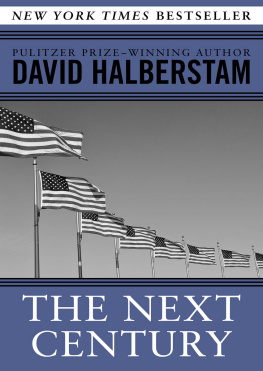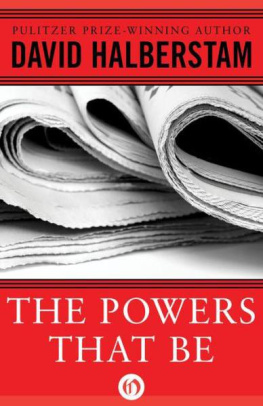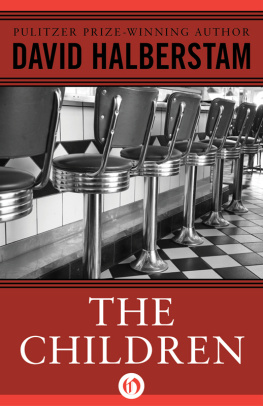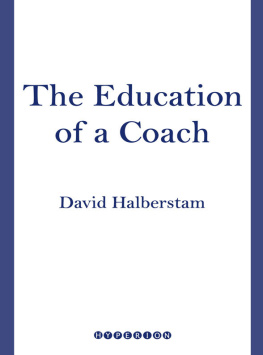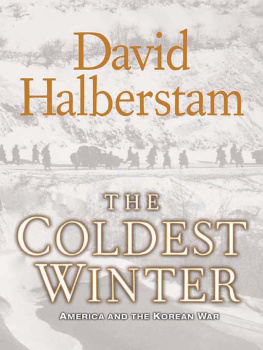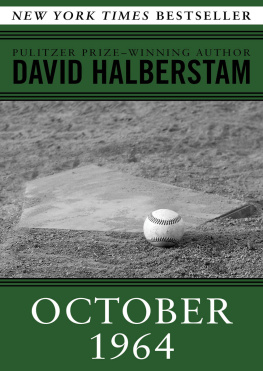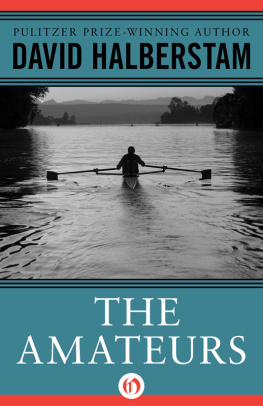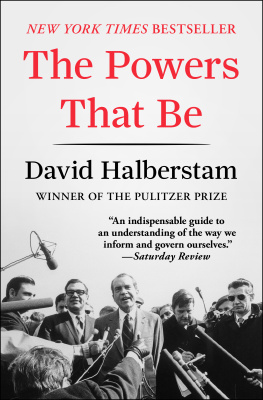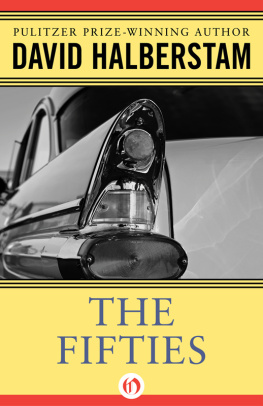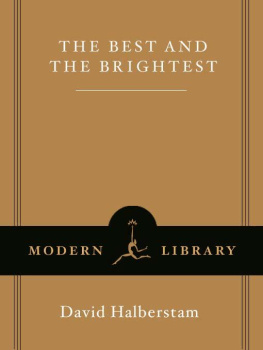Halberstam - The next century
Here you can read online Halberstam - The next century full text of the book (entire story) in english for free. Download pdf and epub, get meaning, cover and reviews about this ebook. City: New York, year: 2012, publisher: Open Road Integrated Media, genre: Politics. Description of the work, (preface) as well as reviews are available. Best literature library LitArk.com created for fans of good reading and offers a wide selection of genres:
Romance novel
Science fiction
Adventure
Detective
Science
History
Home and family
Prose
Art
Politics
Computer
Non-fiction
Religion
Business
Children
Humor
Choose a favorite category and find really read worthwhile books. Enjoy immersion in the world of imagination, feel the emotions of the characters or learn something new for yourself, make an fascinating discovery.
- Book:The next century
- Author:
- Publisher:Open Road Integrated Media
- Genre:
- Year:2012
- City:New York
- Rating:5 / 5
- Favourites:Add to favourites
- Your mark:
- 100
- 1
- 2
- 3
- 4
- 5
The next century: summary, description and annotation
We offer to read an annotation, description, summary or preface (depends on what the author of the book "The next century" wrote himself). If you haven't found the necessary information about the book — write in the comments, we will try to find it.
The next century — read online for free the complete book (whole text) full work
Below is the text of the book, divided by pages. System saving the place of the last page read, allows you to conveniently read the book "The next century" online for free, without having to search again every time where you left off. Put a bookmark, and you can go to the page where you finished reading at any time.
Font size:
Interval:
Bookmark:


For Harrison Salisbury
ON FEBRUARY 26, 1989, I WAS one of two speakers before the governors of the fifty states of the Union. It was a memorable occasion, not merely because of the distinguished audience but also because Henry Kissinger was the other speaker. There he was, well tanned, surrounded by what seemed to be several bodyguards, and looking a little less chubby than he does in his photos. The governors were eager to hear him, for he was to talk about the new, ever more startling events taking place in the Soviet Union. This, then, was not just some abstract speech; this was a speech by one of the most celebrated men of our time on a subject that, in our shrinking world, pressed close to them and their America.
For the first ten minutes or so he really had them. He performed with considerable charm and in the beginning with a great deal of self-deprecating humor. As he started to talk about Gorbachev, their interest was further piqued. They sensed that what was happening in the Soviet Union was the beginning of something historic. If there was any hope for their America, however long-range, it was that there might be a lessening of East-West tensions, which might in turn permit a reevaluation of national priorities, which might eventually result in a redirection of our nations political, emotional, and economic energies. The phrase peace dividend, implying those vast billions that might be used for domestic needs, had not yet become part of the political lexicon, but that was when the idea of a major break in the Cold War was but a glimmer.
It was still relatively early in the Gorbachev Revolution, before the Soviet premier had helped pull the plugs on the various puppet regimes of Eastern Europe. However, by then the Soviets had unilaterally pulled their troops back from Afghanistan. It was clear that something that represented a radical departure from Soviet policies and rhetoric of the past was taking place in Moscow. Just two weeks earlier I had sat in a meeting with Barbara Tuchman, the esteemed American historian, and she had said in the most casual way that the events taking place in the Soviet Union were the most important ones in her lifetime.
Kissinger was having none of it. He was condescending about what Gorbachev was doing, and he was even more condescending about those poor Americans who were taking it all so seriously. His theme was simple: Not only should we be wary of Gorbachev, but if there was any great weakness to American policy during the entire postwar era, it was American naivet, our belief that we could make deals on a personal level with a succession of Soviet leaders. According to him, only the Nixon-Kissinger team had remained immune to this temptation. He made no mention of the Soviet withdrawal from Afghanistan. His speech struck me then (and even more so today) as the last speech of the old order.
I sat three seats away, facing the governors, and I watched their reaction. As Kissinger continued to hammer away with his Cold-War rhetoric, they began to lose interest. The governors are today, I think, quite possibly our best public servants. The better and more experienced ones are well ahead of their counterparts in the Congress in sensing where this country is and where it is headed; one of the ironic outcomes of the Reagan Revolution, with its greatly diminished federal aid to the states, is that it forced state governments, however reluctantly, to become better and more accountable. The senators and members of the House of Representatives live in Washington, where the aura (and the pleasures and the perks) of hegemony still linger; by contrast the governors must live more closely with the realities of posthegemony America. If their states lose factories, they are the ones faced with declining tax bases and less money with which to prepare their citizens for new kinds of work. Congressmen are the ones who speak out on the danger of too much Japanese investment in America; governors are the ones who go hat in hand to Tokyo, begging Japanese firms to locate in their states. What are political abstractions on the floor of the House or Senate are realities in state budgets. In the governors world, politics are closely tied to economics, which has become vastly more important in America in the last ten years.
This, then, was a fascinating scene unfolding in front of me: Kissinger, Nobel laureate, a symbolic figure of the old America, with its marvelous weapons systems, its dominant role among the superpowers, standing in front of these less celebrated public servants, who had to cope with brutal budgets, expanding social needs, deteriorating infrastructures, and public service institutions that often seem overwhelmed by the pressures they faced. America, I thought, meet America.
Even as he finished and left with his entourage, I changed my speech. Generally that year my speeches shared a common theme: the correlation between Japans (and Koreas) primacy in education and their industrial success (and conversely, the correlation between low test scores and lack of productivity and economic health). Instead, somewhat to my own surprise, I spoke about national security.
I said that most of the people talking about national security in this country were ill equipped to do so because they had lost touch with the country, that national security was no longer an index of weaponry (essentially a missile and tank count), if it ever really was, but a broad array of factors reflecting the general state of national well-being. It included the ability of a country to house its people, to feed them, to educate them, to provide them with opportunities in keeping with their desires and education, and to instill in them trust and optimism that their lives were going to be valued and fruitful. Those in Washington were so fascinated with realpolitik and weaponry that they tended to forget that the just and harmonious society was, in the long run, also the strong society.
Other than in its ability to produce military hardware, the Soviet Union had failed miserably. Its great disease was universal cynicism and pessimism. I did not think I was naive about Gorbachev. I did not think that he was pushed by love of freedom as we in the West define it, but I was sure that he was pushed by love of country. His own shrewd, extremely contemporary conclusion (in contrast with those of the geriatric leadership that had preceded him) was that the system from which they and he had so richly benefited was strangling the country.
He was most assuredly a modern man, I suggested, and therefore, he had to know that in terms of economic efficiency the Soviet Union was no longer merely behind the United States, Western Europe, and Japan but in danger of falling behind such emerging countries as South Korea. Moreover, the gap in technology and science between the Soviet Union and its competitors was steadily widening, and this had profound consequences not merely in economic terms but in military ones as well. The high-water mark of the Soviet Unions power probably came in the early sixties at the time of the Cuban missile crisis, when it could manufacture large amounts of traditional, albeit relatively primitive weaponry. This, and the very size of its vast land armies, seemed to substantiate its claim to being a great power. It had been in decline ever since because its economy had not kept up. Or to put it differently, given modern military machinerys dependence upon computers, can a vast country like the Soviet Union, so obsessed by the need for secrecy that it has been afraid of a Xerox machine, let alone widespread use of computers, continue to be a great power? Modern technology demands computers, but computers are not merely instruments of science and warfare; they are instruments of communication as well. Can the Soviets have the former without the latter?
Font size:
Interval:
Bookmark:
Similar books «The next century»
Look at similar books to The next century. We have selected literature similar in name and meaning in the hope of providing readers with more options to find new, interesting, not yet read works.
Discussion, reviews of the book The next century and just readers' own opinions. Leave your comments, write what you think about the work, its meaning or the main characters. Specify what exactly you liked and what you didn't like, and why you think so.

